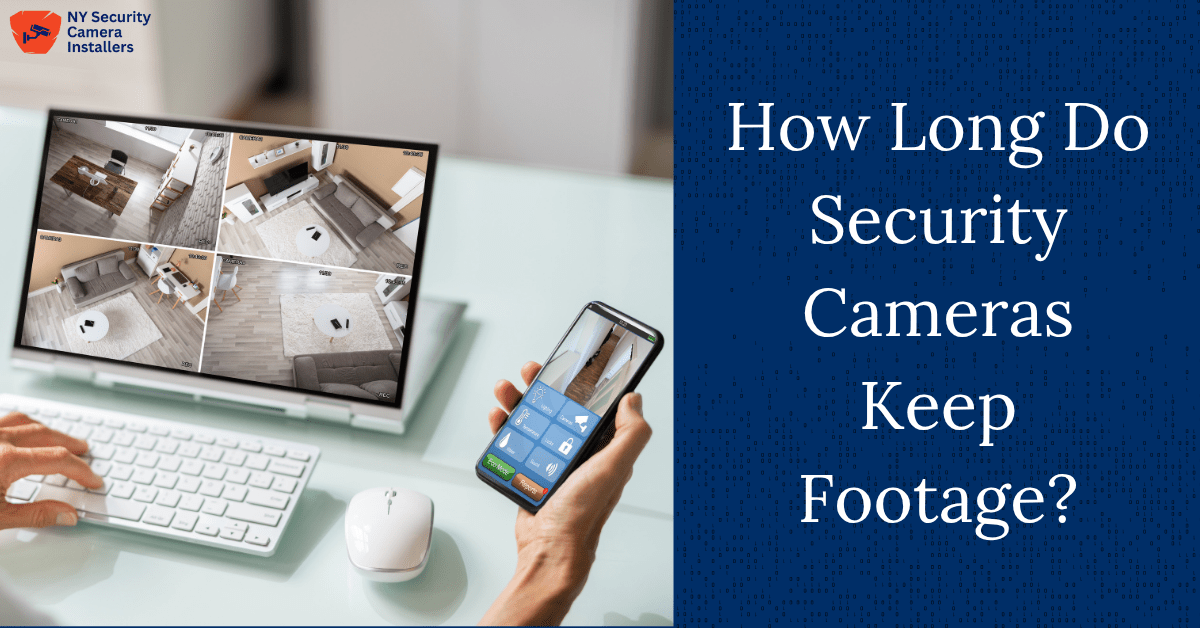Security footage doesn’t last forever, but how long it does stick around isn’t always clear.
Between storage limits, recording settings, and whether it’s in the cloud or on a local device, retention times can vary more than you’d think.
If you’re sorting out how long your system saves recordings (or just want to make sure it’s enough), we’ll break down what actually affects footage storage, and what to look out for.
Key Notes
- Most residential systems store footage for 7-30 days, while commercial systems retain for 30-90 days.
- Storage capacity depends on resolution, frame rate, number of cameras, and compression technology.
- Cloud storage offers flexible retention but costs more than local storage options.
- Legal requirements for footage retention vary by industry, location, and specific business regulations.
Security Camera Footage Retention
Security camera footage retention refers to the duration video recordings remain accessible before being automatically overwritten or deleted.
This timeframe varies significantly based on several key factors, including your storage system, recording settings, and specific industry requirements.
Factors Influencing Retention Periods
Storage Technology
The hardware storing your footage significantly impacts retention capabilities:
- Digital Video Recorders (DVRs): Store footage for 7-30 days based on capacity.
- Network Video Recorders (NVRs): Provide 30-90 days of storage.
- Cloud Storage: Offers 7 days to unlimited retention based on subscription.
- SD Cards: Limited to 1-7 days due to capacity constraints.
Recording Settings
How your system captures footage directly affects storage requirements:
- Continuous Recording: Consumes storage quickly but provides complete coverage.
- Motion-Activated Recording: Extends retention periods by 3-5 times compared to continuous recording.
- Scheduled Recording: Balances coverage with efficient storage use.
Resolution and Frame Rate
Higher quality requires more storage space:
- 720p (HD): Allows for longer retention with moderate detail.
- 1080p (Full HD): Requires more storage for excellent detail.
- 4K (Ultra HD): Reduces retention periods due to high storage demands.
Frame rates also impact storage – 30fps requires twice the storage of 15fps.
Typical Retention Periods Across Different Environments
| Environment | Typical Retention Period | Key Considerations |
|---|---|---|
| Residential | 7-30 days | Storage capacity, cost considerations |
| Small Business | 14-60 days | Insurance requirements, incident investigation needs |
| Retail | 30-90 days | Theft investigation, liability claims |
| Corporate | 30-180 days | Compliance requirements, security protocols |
| Banking | 90-180 days | Regulatory requirements, fraud investigation |
| Healthcare | 30-90 days | Patient privacy, controlled substance monitoring |
| Government | 90+ days | Security protocols, legal requirements |
Case Study: Walmart's Retention Policies
Walmart’s approach to video retention demonstrates how large organizations manage surveillance footage effectively.
They maintain different retention periods based on risk assessment, with high-theft areas and cash-handling locations keeping footage longer than general merchandise areas.
Storage Technologies
Your choice of storage technology directly determines how long security footage remains accessible.
Local vs. Cloud Storage
Advantages:
- One-time purchase with no recurring fees
- No internet dependency for basic operation
- Complete control over your data
Limitations:
- Fixed capacity requiring hardware upgrades
- Vulnerable to theft or damage
- Limited remote access capabilities
- Typical retention: 7-90 days depending on capacity
Cloud Storage
Advantages:
- Scalable capacity with subscription-based models
- Remote access from anywhere
- Protection from on-site damage or theft
Limitations:
- Requires reliable internet connection
- Ongoing subscription costs
- Potential privacy concerns with third-party storage
Hybrid Solutions
Many modern systems combine local and cloud storage, providing cost-effective retention while ensuring important footage remains accessible for extended periods.
Privacy and Security Considerations
Balancing security needs with privacy concerns requires thoughtful management of footage retention.
Key considerations include:
- Access controls: Limiting who can view footage and implementing audit trails.
- Encryption: Protecting stored video from unauthorized access.
- Retention policies: Automatically deleting footage after defined periods.
Not Sure How Long Your Footage Stays Stored?
Frequently Asked Questions
How can I determine exactly how much storage my specific security camera system needs?
Use the formula: (bitrate × hours of recording per day × days of retention × number of cameras) ÷ 8 = required storage in bytes. Many manufacturers offer online calculators specific to their camera models.
What happens to my footage if my storage device fails?
Without a backup system, your footage will likely be lost. Consider redundant storage solutions like RAID configurations or cloud backups.
Can I selectively save important footage beyond the standard retention period?
Yes, most modern systems allow you to export and archive specific footage indefinitely.
How does weather or environmental conditions affect outdoor security camera storage requirements?
Extreme weather can trigger more motion events, increasing storage needs. Systems in high-traffic areas may require more storage capacity.
Conclusion
How long your security footage sticks around depends on a mix of tech, settings, and how much you need to store.
Most homes hold onto recordings for about a week or two, while businesses and regulated industries often stretch that to 90 days or more.
The right setup balances cost, compliance, and peace of mind – whether you’re using DVRs, cloud subscriptions, or a mix of both. If you’re not sure how long your system keeps footage (or if it’s keeping the right footage) it’s probably time for a check-in.
Get in touch for a free quote tailored to your storage and security camera needs. We’ll help you figure out what works best without overcomplicating it.


